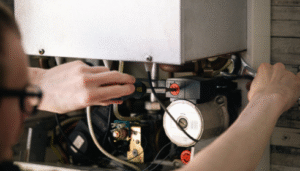If you’ve ever poured yourself a glass of tap water and paused, wondering what’s really in it, you’re not alone. Across Texas, homeowners are realizing that water quality isn’t just about taste—it’s about health, plumbing safety, and even peace of mind. The truth is, we don’t often think about water beyond turning on the faucet. But the stuff running through those pipes shapes so many parts of daily life: the coffee in your mug, the soup simmering on the stove, the shower that either feels refreshing or leaves you itchy.
Water testing, though, doesn’t always get the spotlight it deserves. It’s not as flashy as a new kitchen remodel or as urgent as a leaking roof, but it quietly carries a bigger weight than most of us imagine.
Why Texans Need to Care About What’s in Their Water
Texas is big, and so is the variety in its water quality. In one county, families might deal with hard water that chews through dishwashers. A few towns over, the concern might be nitrates from agricultural runoff or lingering chlorine from municipal systems. These differences matter because your water isn’t just “water”—it’s a complex mix influenced by the land, the pipes, and the systems feeding it into your home.
That’s why TX Water Treatment water testing has become more than a checklist service. It’s a way to peel back the mystery and get clear answers. What you learn could be surprising—sometimes it’s harmless minerals, sometimes it’s contaminants you’d never expect. But either way, knowledge gives you the power to protect your family and make smart choices about filtration or treatment systems.
Everyday Signs That You Might Need Testing
Not everyone books a test because of alarming news headlines. For many households, the clues are subtle:
- Water that smells faintly of rotten eggs.
- Stubborn soap scum that laughs at your cleaning products.
- A metallic taste when you fill up a glass.
- Dry hair and itchy skin that never quite seem to improve.
These aren’t just annoyances. They can be signals of larger issues—from excess sulfur to heavy metals—that testing can confirm. And even if your water looks and tastes fine, that doesn’t always mean it’s clean. Some contaminants, like lead or arsenic, are invisible and tasteless.
The Rise of Local, On-Demand Services
One of the best things about living in Texas today is the range of services at your fingertips. A quick search for a home water testing service near me brings up professionals who can visit your home, collect samples, and deliver results faster than you might expect. For busy families, that convenience means no guessing, no mailing off samples yourself, no wondering if you did it right.
Local services are especially helpful because water quality isn’t the same across the state. A pro working in Austin will know the typical municipal concerns there, while someone in West Texas might be more familiar with rural well water issues. That local know-how makes a difference when it comes time to interpret the results.
The Science Behind Testing
It’s not just dipping a strip in a glass of water, though that’s a start. Professional testing involves checking for a wide range of factors: pH balance, hardness levels, bacterial contamination, heavy metals, and even volatile organic compounds. Some tests go deeper, tracking nitrates or fluoride.
Think of it like a blood test for your home. A doctor wouldn’t rely on a quick glance to declare you healthy, and neither should you rely on assumptions about your water. With lab-grade testing, you get a breakdown that’s hard to argue with—numbers, charts, and specific recommendations that tie directly into treatment solutions.
Why DIY Kits Aren’t Always Enough
Sure, you can grab a water test kit at a hardware store, and it’ll give you some idea of what’s happening. But the catch? They’re often limited in scope, and interpreting the results can be tricky. One color shade looks like another, and suddenly you’re left guessing whether that faint orange means “safe” or “call an expert now.”
That’s where professional water testing Texas comes in. The difference lies in precision and interpretation. A certified technician doesn’t just tell you what’s in your water; they explain what it means and how it compares to safety standards. That guidance saves you from both underreacting to real risks and overspending on unnecessary solutions.
Long-Term Benefits You Don’t Always See
Water testing isn’t a one-and-done deal. The ground shifts, pipes age, city treatment plants adjust their formulas—your water today may not look like your water next year. Keeping tabs on changes can protect you from slow-creeping issues that might otherwise go unnoticed.
There’s also the financial angle. Hard water, for example, doesn’t just dry out your skin—it shortens the life of appliances like dishwashers and water heaters. Catching that early through testing and installing a softener can save hundreds, if not thousands, over the years.
And let’s not forget the peace of mind. Knowing your kids’ drinking water is safe takes one big “what if” off your plate as a parent. That’s hard to put a price on.
Stories That Hit Close to Home
I recently spoke with a family in Houston who thought their constant plumbing repairs were just bad luck. After finally booking a professional test, they discovered sky-high levels of hardness. Once they installed a system to address it, their repair bills practically vanished.
Another case in a rural Texas town involved a couple using well water. They had no visible issues but decided to test after hearing neighbors mention nitrates. Sure enough, their results showed levels above recommended limits. With treatment in place, they avoided what could have turned into a serious health problem.
These aren’t rare stories—they’re everyday examples of how testing uncovers truths hiding in plain sight.
Wrapping It All Up
Water is something we take for granted until it becomes a problem. But the good news is that we don’t have to wait for disaster to strike. Testing offers clarity, safety, and even financial benefits, all while making everyday life a little easier.
So whether you’re sipping coffee in Dallas, filling a bathtub in San Antonio, or running a farm in Lubbock, think of water testing as a quiet investment in your future. It’s not about being paranoid—it’s about being prepared.
And the next time you pour that glass of water, wouldn’t it be nice to know exactly what’s in it?
 Previous post
When the Heat Goes Out: Navigating Repairs, Replacements, and the Hunt for Honest Help
Previous post
When the Heat Goes Out: Navigating Repairs, Replacements, and the Hunt for Honest Help

